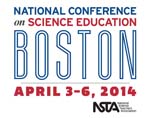“Engineering and Science: Technological Partners”: Featured Strand at NSTA’s 2014 National Conference on Science Education in Boston, MA, April 3–6
By Lauren Jonas, NSTA Assistant Executive Director
Posted on 2014-02-02
 This April, the National Science Teachers Association (NSTA) will feature a special strand “Engineering and Science: Technological Partners” at our 2014 National Conference on Science Education, in Boston, April 3–6.
This April, the National Science Teachers Association (NSTA) will feature a special strand “Engineering and Science: Technological Partners” at our 2014 National Conference on Science Education, in Boston, April 3–6.
Science teachers who are integrating science and engineering practices into their instruction won’t want to miss this. With the NRC Framework and the Next Generation Science Standards defining science and engineering as intertwined, teachers are expected to integrate both within the science curriculum. And with the explosion of technology available, many teachers are hungry for tried-and-true advice from their peers about the latest tools and resources that will truly enrich their classrooms. This strand explores the thoughtful, effective, and meaningful integration of technologies to increase STEM learning and understanding.
Sessions organized around this strand include a featured presentation on Thursday, April 3 3:30–4:30 PM (“Engineering and Science: Strengthening the Partnership”) by Yvonne M. Spicer (Vice President for Advocacy and Educational Partnerships, National Center for Technological Literacy, Museum of Science: Boston, MA). More sessions on Engineering and Science: Technological Partners include the following:
- A PBL Involving Coffee Temperature
- sTem: Merging Technology with Engineering
- Science 2.0: Putting Web 2.0 into the Science Classroom
- iPads in Science
- The World of Google in Science
- Using Evernote, Wikis, and Blogs to Create a Science Diary
- Digitizing the Learning Experience and Taking IT Mobile
- How-To Workshop on Organizing a STEM Design Challenge Day
- Going Beyond Data Collection—Sharing in a Science Classroom
- Google Me This: How to Make Collaboration Work in a Wiki World
- Engage Students by Writing Your Own Science Book
- Engineering Practices in Early Childhood: Designing Mechanisms with Mech-a-Blocks
- Bridging Engineering and Science
- Supporting Students in Optimizing Engineering Design Solutions with Modeling and Mathematics
- Advancing Science Learning: Teaching Elementary Life Science Through Engineering Problems
- Bioengineering Challenges and Middle School Life Science
- The Science of Solubility: Using Reverse Engineering to Brew a Perfect Cup of Coffee
- 3-2-1 Blastoff!
- Slingshot Physics: An Authentic Application of Work, Energy, Friction, and Newton’s First Law of Motion
- Burps and Chirps: Using Bioacoustics to Encourage Inquiry-based Learning in STEM
Want more? Check out more sessions and other events with the Boston Session Browser/Personal Scheduler.
Disclaimer: The views expressed in this blog post are those of the author(s) and do not necessarily reflect the official position of the National Science Teaching Association (NSTA).


